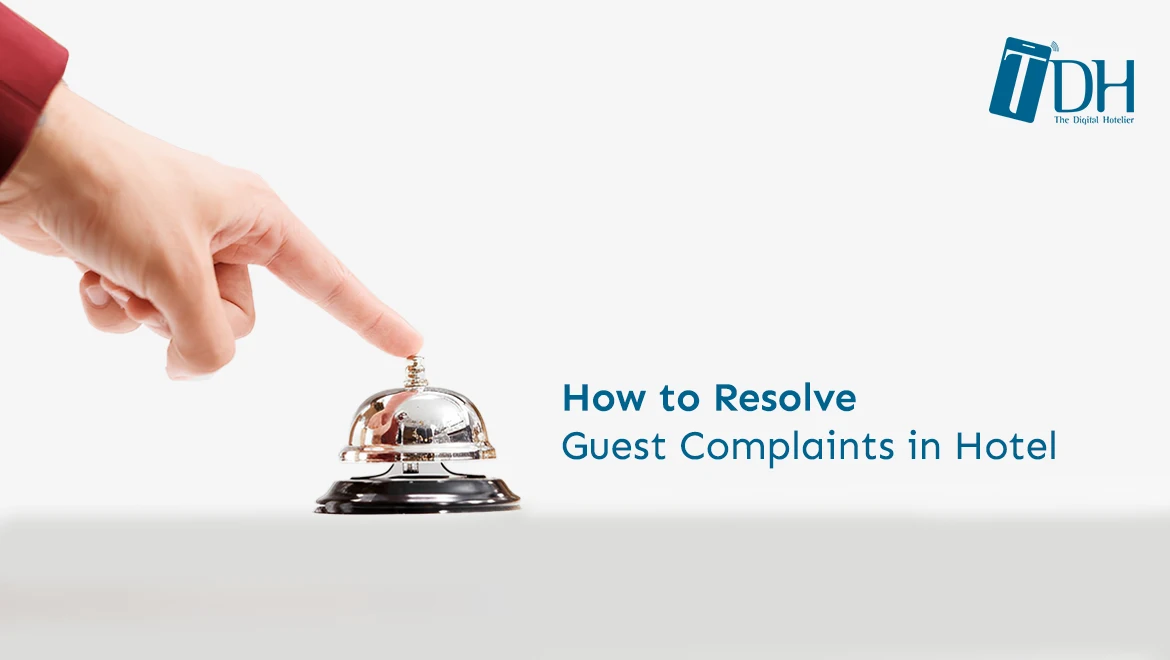An unresolved guest complaint is a direct threat to your revenue, as 48% of guests will leave a review after a bad hotel experience. This turns a private issue into a public problem that deters future bookings.
But a complaint is also a rare opportunity. Research shows that guests whose issues are resolved successfully can become even more loyal than those who never had a problem, turning a crisis into a win.
This guide walks you through how to resolve guest complaints in hotel. We’ll also show how the right system, like TeamStream, makes this process seamless and powerfully data-driven.
Why Handling Guest Complaints Matter in Hospitality
A guest complaint is not just an annoyance. It’s a signal that expectations didn’t match reality.
- A faulty AC? It’s not just a maintenance issue, but a breakdown in your preventive systems.
- A slow check-in? That’s a process gap, not just a busy day at the desk.
- A noise complaint? That’s a failure to deliver on your hotel’s #1 promise: rest.
When you reframe complaints as free, real-time feedback, they become one of your most valuable sources of operational insights.
Handled poorly, they damage your brand. Handled well, they transform guests into repeat visitors and even advocates.
The Hidden Cost of Ignoring Complaints
Unresolved complaints do more than frustrate guests. They create a ripple effect that’s expensive and hard to recover from:
- Online reputation damage: Permanent one-star reviews that drive future guests away.
- Lost revenue: Fewer bookings and reduced ADR.
- Higher acquisition costs: You spend more on marketing to replace lost guests.
- Lower guest loyalty: The repeat business cycle breaks, making it nearly impossible to build customer loyalty in hotels.
- Staff burnout: Team morale drops, turnover rises, and hiring costs increase.
Every unresolved complaint chips away at profitability. That’s why a clear complaint-handling process isn’t just “good service”. It’s a revenue protection strategy.
Most Common Guest Complaints in Hotel (and What They Really Mean)
Complaints might seem random, but most fall into predictable categories. Here’s what they reveal about your operations:
Hotel Room Complaints
Examples: Poor cleanliness, broken AC, slow Wi-Fi, or mismatched room descriptions.
What It Really Means: Weak SOPs in housekeeping, gaps in inspections, or missed preventive maintenance. Improving hotel housekeeping efficiency can prevent these issues from the start.
Service-Related Complaints
Examples: Long check-in, unhelpful staff, or delayed room service.
What It Really Means: Inefficient processes, understaffing, or inadequate training.
Hotel Noise Complaints
Examples: Loud neighbors, hallway disruptions, street noise.
What It Really Means: Poor soundproofing, weak enforcement of policies, or slow staff response.
Billing and Pricing Complaints
Examples: Hidden fees, minibar errors, incorrect final bills.
What It Really Means: Lack of pricing transparency, PMS errors, or poor communication at check-in.
Understanding the root cause of each complaint is the first step to fixing—not just patching—problems.
How to Resolve Guest Complaints in Hotel – The 5-Step (L.E.A.R.N.) Method
Your staff doesn’t need to “wing it” every time a guest is upset. Equip them with a consistent process that’s easy to remember:
- L – Listen
Give the guest space to share their story without interruption. Active listening diffuses tension. - E – Empathize
Show you understand. Acknowledge feelings before you try to fix the problem. - A – Apologize
Offer a sincere apology for their inconvenience, no matter who’s at fault. - R – Resolve
Take ownership and offer a solution immediately. Empower staff to act without waiting on approvals. - N – Notify & Document
Log the issue, notify the right department, and follow up with the guest. This prevents repeat problems and closes the loop.
Handling Guest Complaints Online (Reviews + Social Media)
When a guest goes public, the same L.E.A.R.N. principles apply, but with one key difference: your response is on display for future guests.
- Act fast: Aim to respond within hours, Nearly 75% expect reply within 24h (Sprout Social).
- Acknowledge publicly: Thank them for the feedback, and apologize briefly.
- Move offline: Share a direct contact for resolution.
- Stay professional: Future guests are watching, so tone matters more than ever.
Channeling Feedback Directly with The Digital Hotelier’s Guest App
Not every guest wants a face-to-face confrontation. Our guest-facing app gives them a direct, digital line to management, allowing you to capture valuable feedback and resolve issues silently and efficiently.
Here’s why this is a game-changer for handling hotel guest complaints:
- Empowers Quiet Guests: Gives non-confrontational guests a discreet way to speak up.
- Enables instant service recovery: allowing you to solve issues before the guest checks out and the problem becomes permanent.
- Prevents Public Reviews: Gives you the chance to fix issues before they become damaging one-star reviews.
- Captures More Data: Collects feedback on minor issues that often go unreported.
By integrating the guest-facing app from The Digital Hotelier, you not only handle today’s hotel guest complaints better, but you also gather the data needed to prevent them tomorrow.
How to Prevent Hotel Guest Complaints Before They Happen
The best complaint is the one that never happens. Here’s how to shift from reactive firefighting to proactive hospitality:
- Enable instant communication: Use centralized tools so departments don’t work in silos.
- Digitize your checklists: Standardize inspections and maintenance with digital SOPs.
- Analyze complaint data: Spot patterns (e.g., recurring Wi-Fi issues on one floor) and fix them systemically.
- Invest in preventive maintenance: Don’t wait for guests to discover what’s broken.
- Train for anticipation: Teach staff to set expectations and spot issues before they escalate.
Ultimately, the most effective answer to the question of how to resolve guest complaints in hotel is to build a system that prevents them entirely.
This strategic shift from reactive to proactive is made possible by leveraging the right technology, TeamStream.
Turning Complaints into Opportunities with TeamStream
Without the right system, even the best staff will fall into reactive chaos:
- Complaints get passed verbally.
- Notes get lost.
- Accountability disappears.
- The same problems keep resurfacing.
With TeamStream by The Digital Hotelier, your hotel gets a central, streamlined process:
- Log everything: No feedback slips through the cracks.
- Assign instantly: The right department is notified in seconds.
- Track status: Everyone sees whether an issue is open, in progress, or resolved.
- Analyze data: Spot patterns, track costs, and measure guest recovery.
- Prevent issues: Use insights to fix root causes permanently.
| L.E.A.R.N. Step | Guest-Facing Action | How TeamStream Support |
| Listen | Guests share their story. | Complaint logged instantly in one system. |
| Empathize | Guest feels understood. | Staff see context + history for personal replies. |
| Apologize | Guest hears a sincere apology. | Full complaint history keeps tone consistent. |
| Resolve | Guest sees fast action. | Tasks assigned + tracked in real time. |
| Notify | Guest gets follow-up. | Issue documented + shared across teams. |
TeamStream is the system that turns your guest complaint handling from a daily headache into your most powerful engine for improvement.
FAQs about How to Resolve Guest Complaints in Hotel
Here are answers to some of the most frequently asked questions about guest complaint handling in the hotel industry.
How to respond to a hotel complaint?
The best response follows a clear, step-by-step process. We recommend this framework:
- Listen: Let the guest speak without any interruption.
- Empathize: Validate their feelings and show you understand.
- Apologize: Offer a sincere apology for the inconvenience.
- Resolve: Take ownership and provide an immediate solution.
- Notify & Document: Log the issue to prevent it from happening again.
How would you handle a difficult guest complaint?
For difficult hotel guest complaints, the key is de-escalation and control:
- Stay calm and professional; never take it personally.
- Listen actively to allow the guest to vent their frustration.
- Show empathy and respect to de-escalate the tension.
- Focus on what you can do and offer clear, actionable solutions.
What is the biggest mistake hotels make when handling complaints?
The biggest mistake is not learning from them. They fail to track and analyze common guest complaints, so the same preventable problems happen again and again, damaging the hotel’s reputation over time.
How can technology like TeamStream help prevent complaints?
TeamStream prevents complaints in two key ways: by fixing issues in real-time before they affect guests, and by using data from past complaints to solve systemic problems.
- It connects your teams (housekeeping, maintenance, etc.) to report and fix small issues on the spot.
- Its dedicated Complaints Module logs every issue, allowing you to analyze patterns and find the root cause of recurring problems.
- This transforms your complaint data from a simple log into a powerful tool for proactive, long-term improvement.
What types of guest complaints can TeamStream manage?
TeamStream is designed to manage all types of guest complaints in a hotel. It allows you to instantly categorize, assign, and track any issue, from simple housekeeping guest complaints to complex maintenance or service failures.
In modern hospitality, guest complaints are inevitable, but they don’t have to be a threat that causes your hotel to lose money.
With the right mindset and a powerful software like TeamStream, every piece of negative feedback becomes your greatest asset for building a stronger, more resilient, and guest-obsessed hotel.
Ready to turn your complaint handling process from a liability into a strategic advantage? Schedule your personalized demo of TeamStream today.

